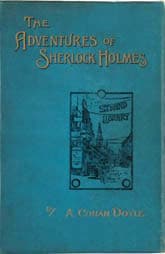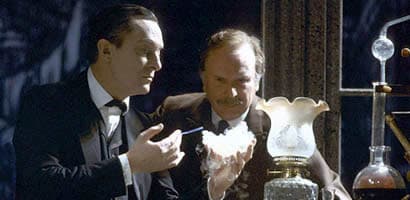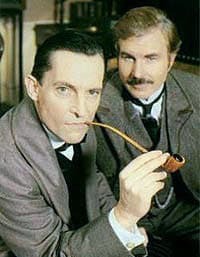The Adventures of Sherlock Holmes
Critique • Quotes • Text • Sherlock Holmes at the movies
 First edition
First editionFirst publication
1892
Literature form
Story collection
Genres
Crime, mystery
Writing language
English
Author's country
England
Length
Twelve stories, approx. 94,000 words

Jeremy Brett becomes the new Holmes, seen here with his second Watson, Edward Hardwicke.
The deliciously eccentric, literary Holmes
Sherlock Holmes (1984–1994): Also known as The Adventures of Sherlock Holmes; television series of forty-one films and episodes; featuring Jeremy Brett, David Burke (1984–1985), Edward Hardwicke (1986–1994)
Holmes aficionados were overjoyed in the 1980s and 1990s to get several series produced by Granada for British television that are most faithful to the novels and stories than anything that has gone before.
Jeremy Brett gives an eccentric but brilliantly effective portrait of an eccentric but brilliantly effective Sherlock Holmes. He's someone you could imagine being both an addict and an incisive genius, both a cynical introvert and a flamboyant upholder of Victorian society's values.
Several other Sherlock Holmes productions were in the works during these years, but none of them come close to this project in popularity. And with this series, Brett becomes the publicly accepted face of the great detective in the second half of the twentieth century, much as Rathbone had in the first.
The Granada films present about two-thirds of Doyle's Holmes oeuvre, starting with the series The Adventures of Sherlock Holmes in 1984–1985. It continues with further series The Return of Sherlock Holmes followed from 1986 to 1988, The Casebook of Sherlock Holmes from 1991 to 1993, and The Memoirs of Sherlock Holmes in 1994. Despite using Doyle's titles from his collections of stories, the various series do not always contain the episodes found in each of those collections.
Included with these hour-long episodes in each series are longer individual films, namely The Sign of Four (1987), The Hound of the Baskervilles (1988), The Master Blackmailer (1992, based on "The Adventure of Charles Augustus Milverton"), The Last Vampyre (1993, based on "The Adventure of the Sussex Vampire"), and The Eligible Bachelor (1993, from "The Adventure of the Noble Bachelor").
Brett has two worthy actors play Watson to his Holmes. The first series features David Burke as an energetic, thirtyish Watson, although he often gives the impression of suppressing a slight (understandable) annoyance at Holmes's behaviour. When he left to take a role elsewhere, he was replaced by Edward Hardwicke who was older and more laid-back but made every effort to carry on in Burke's style.
Together Brett and Burke/Hardwicke create on screen the pair that most resembles Doyle's vision—the plodding but wise Watson (like Doyle he's a doctor and an author, after all), acting not only as foil but as an essential aid to Brett's brilliant, moody and somewhat scary Holmes.
In several episodes, Charles Gray has some memorable scenes as Holmes's brother Mycroft, reprising his role from The Seven-Per-Cent Solution.
Apart from being a fascinating actor, Brett also brought a reverence for the written word to the series. He was constantly on the lookout for anything that might betray Doyle's original vision. A small but telling point, for example, is that he didn't sport the deerstalker cap and cape that had been introduced early in movie adaptations, unless they were justified by the dramatic situation. In his jaunts around London his Holmes dresses in the clothes that Doyle's English gentleman would have worn in the 1890s, including a top hat when the occasion called for it.
The only major exception Brett took to the original text came partway through the series when he decided to drop his character's overt drug use because he realized kids were looking up to Sherlock Holmes on television.
While sticking closely to the external Holmes as written, Brett created an inner Holmes that had been only implied by the stories. His mannerisms—dismissive waving of hands, abrupt barks of laughter, crawling on hands and knees looking for clues, towering stillness as he thought, and dissipated withdrawal when no cases worthy of his intellect were available—all these outer actions reflect a deeply disturbed man, a man only sporadically in command of his mania and his depression. Watching Brett we realize this is there in the stories from the beginning and has been brought out only in pieces by various other performers. Only Brett manages the balance perfectly.
About his performance, Brett himself was only partially satisfied, worrying he got the eccentricity and passion of the character right but could never quite portray the cool, logical processes also taking place in Holmes's mind.
There is something to this self-criticism. Perhaps his Sherlock is a touch too much on the edge. But do we really want to watch a computer at work? Give us the human being with all its contradictions and we'll infer the rational being from his rational successes.
A Hound of contention
The greatest version of The Hound of the Baskervilles ever may be the one that comes in the middle of Brett's run, although this is controversial. Some feel it is one of Brett's weaker turns as Holmes while others call it his best. Perhaps this is because, as in the book, Holmes is not at centre stage for about half the story.
The load is carried by actor Hardwick, the second and more laid-back Watson in this television series. He may be the closest ever to the quietly intelligent but self-effacing Watson that Doyle envisioned, though perhaps not quite the gallant ladies man of the books.
Argument scene between Holmes and Watson in the Brett-Burke series.
This 105-minute film is full of mystery, atmosphere, fine acting and compelling drama. Whether it's better for its time than the 1939 Rathbone version was for its time, or the 1959 Cushing version was for its time is hard to say. But it may be the best available for all time, if you know what I mean.
In the latter part of the series, well after Hound, Brett is obviously unwell, looking puffy and pasty. He also slows down a little as Holmes, seeming less frenetic, less arrogant. But by this time, if you've been watching the series from the beginning, you accept these changes as the natural aging of the character, a consequence of his earlier behaviour as he comes to terms with his own mortality.
Not that this Holmes is mortal in the ordinary sense. For Brett fulfilled his goal to become the greatest Sherlock Holmes ever. For us, he became Holmes.
Our only regret is that he did not live to complete the entire Doyle oeuvre, though he came far closer than anyone else—both in quantity and quality.
After Brett, it would be impossible for anyone else to play Sherlock Holmes straight up and not suffer from the comparison.
— Eric
Critique • Quotes • Text • Sherlock Holmes at the movies
1922, 1929–1933, 1931–1937, 1939–1946, 1954–1955, 1959–1984, 1962–1992, 1965, 1970, 1975–1988, 1976, 1979, 19829, 1984–1994, 2000–2002, 2002, 2002b, 2009–2011, 2010–2017, 2012–2019, 2015


